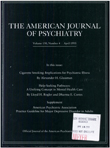Determining disability due to mental impairment: APA's evaluation of Social Security Administration guidelines
Abstract
OBJECTIVE: APA evaluated the Social Security Administration's (SSA's) medical standards and guidelines for determining disability due to mental impairment to determine how well the standards and guidelines operationalize the statutory definition of disability in a manner consistent with current psychiatric practice. METHOD: Seventy-two psychiatrists were trained in one of two procedures: those in the sequential evaluation condition were trained in the process and forms used by the SSA's reviewing medical consultants, and those in the statutory definition condition were trained in the statutory definition of disability and application of clinical judgment according to this standard. Decisions regarding claimant's ability or inability to work were recorded on an instrument designed for the study. Each condition consisted of 12 panels of three members. They reviewed 732 actual claims for disability benefits. The panelists reviewed claims independently, then rendered panel judgments. Each claim was reviewed by one panel in each condition. RESULTS: The proportion of agreement between conditions for panel decisions (0.77) was higher than chance agreement (kappa = 0.46). The high level of agreement on claims judged to have good medical evidence and on which confident decisions were made (proportion of agreement = 0.96, kappa = 0.78) suggests that disagreements largely reflected ambiguities in application of the standards and guidelines to more complex cases or those with inadequate information. CONCLUSIONS: The SSA's revised medical standards and guidelines reflect clinical decisions about ability to work based on the statute and, with procedural modifications, should be retained. The SSA should be involved in further systematic studies to develop a field of scientific inquiry into disability and psychiatric disorders.
Access content
To read the fulltext, please use one of the options below to sign in or purchase access.- Personal login
- Institutional Login
- Sign in via OpenAthens
- Register for access
-
Please login/register if you wish to pair your device and check access availability.
Not a subscriber?
PsychiatryOnline subscription options offer access to the DSM-5 library, books, journals, CME, and patient resources. This all-in-one virtual library provides psychiatrists and mental health professionals with key resources for diagnosis, treatment, research, and professional development.
Need more help? PsychiatryOnline Customer Service may be reached by emailing [email protected] or by calling 800-368-5777 (in the U.S.) or 703-907-7322 (outside the U.S.).



